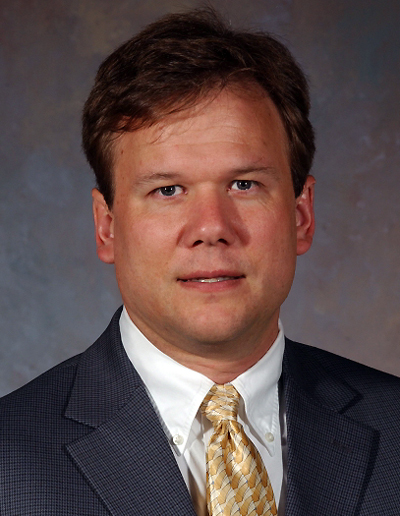Wisely Named Director of Baylor's Honors Program

Andrew Wisely
by Lori Fogleman, director of media relations, (254) 710-6275
Dr. Thomas S. Hibbs, dean of the Honors College at Baylor University, has announced the appointment of Dr. Andrew C. Wisely, associate professor of German and director of the division of German and Russian, as director of the Honors Program at Baylor.
Wisely's appointment officially was effective June 1. He succeeded Dr. R. Alden Smith, who has directed the Honors Program since the untimely death in summer 2004 of newly-appointed director Dr. Ray Wilson. Smith took over the Honors Program, while continuing his additional duties as professor chair of classics, associate dean of the Honors College and director of the University Scholars Program. For nearly two years, Wisely assisted Smith as faculty assistant director of the Honors Program.
"Alden came into a very difficult situation and, as he does with everything, infused energy and vision into a program that needed both structural reform and inspiration," Hibbs said. "With Andy's help as faculty assistant director, Alden began working on the freshmen-year experience and the crucial pre-thesis junior year. Under their leadership, in just two years, the retention-to-graduation rate in the Honors Program has nearly doubled, even as incoming classes have hit record highs. We have every confidence that Dr. Wisely will continue the successful paths begun by Dr. Smith."
"Professor Wisely brings a great deal of energy to the position of director of the Honors Program," Smith said. "He has worked closely with all members of the program for the past two years in his role as faculty assistant director, getting to know the students through advising, colloquia and his supervision of the junior-year thesis preparation program. I am certain that Dr. Wisely will maintain his close relationship with students, while at the same time providing the program with leadership and direction."
Wisely joined the Baylor faculty in 2003. Prior to arriving at Baylor, he taught German, linguistics and a freshman liberal arts seminar for nine years at Anderson University in Anderson, Ind. A 1985 honors graduate of Wheaton College, Wisely earned his doctorate in German literature from Washington University in St. Louis in 1993.
Wisely's research and teaching interests lie in 19th and 20th-Century German literature, culture and intellectual life, especially of turn-of-the-century Austria. His area of specialization has centered on the writings of and about the Viennese writer Arthur Schnitzler (1862-1931). He has published several articles and reviews in scholarly journals, such as German Quarterly and Journal of Christianity and Foreign Languages. In addition, he is an active presenter internationally on German and Austrian studies, as well as foreign language instruction.
Established in 1959, Baylor's Honors Program is designed to enhance and enrich the academic experience of talented, highly motivated students. The program supplements traditional degree requirements and majors in all departments and schools of the university by offering smaller, distinctive classes, encouraging interdisciplinary approaches to learning, and providing opportunities for students to pursue independent study and research with individual faculty mentors. Honors students, through their shared activities and dedication to academic excellence, become a community of scholars that builds connections between specialized fields of inquiry and that reinforces Baylor's commitment to the ethical application of knowledge.
"I look forward to more discussions about the direction of the Honors Program," Wisely said. "How does it fit within the aim of the Honors College to become increasingly attractive to top students nationwide? How do we ensure that the challenges and rewards of community learning stay irresistible to busy students and busy faculty mentors?"
Wisely said the most rewarding thing for him is watching increasing numbers of students enter the scholarly conversation through a guided process of research and writing.
"Achieving the thesis may mean long lab hours or several drafts of a literary interpretation, but it is a discipline valuable for its own sake -- not just in helping to land a desired job or grad school admission," he said. "Of course, to assist in guiding every step of the Honors process, I need an excellent staff and faculty, and I have it."